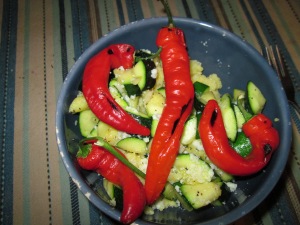I’m not known for my speed in the kitchen (or just about anywhere for that matter). I usually shy away from complicated recipes with numerous steps and complicated procedures because I know that even straightforward dishes take me longer than I think they will. Since I try to avoid processed foods, preferring to make most meals from scratch with simple ingredients and lots of fresh seasonal produce, it can be a scramble to cook, eat, clean up, and charge back out the door. Here are some strategies that help me get meals on the table a little faster:
1. Plan ahead, make ahead. Sketching out meals at the start of each week means you can dive right into cooking rather than pondering the dwindling contents of the fridge. It also enables you to strategize for days when you are busiest and possibly get a head start. Briefly consider the order and timing for the different steps involved in preparing a meal, and how they might fit into your day. Could something be left overnight, or to simmer or bake while you work on other things?
For instance, I use beans in a lot of my meals. I generally cook up a large pot once or twice a week and then incorporate the “bean of the week” into several meals. While it takes an hour or two for beans to cook, they require very little on my part, just some advanced planning to figure out a time when I’ll be around the house and able to give them a stir from time to time. If I have space on the stove, I can even let them simmer on a back burner while I am busy preparing another meal. By the time I am finished cooking, eating, and cleaning up, the beans are well on their way! I realize most people are not as avid bean eaters as I am. However, the same principles apply to any staple or part of a meal that takes a while to prepare, requires little active work, or can be easily stored for later. (Sauces, grains, baking, chopped vegetables…) It might help to consider what convenience foods you are drawn to and whether you might be able to replicate any of them when you have a pocket of time.
2. Never underestimate the power of leftovers! When you prepare a dish, especially a complicated one, make double or even triple the amount you need for a meal. Save the rest to enjoy when you’re too busy or hungry or tired or crunched for time to cook. This works especially well with soups, stews, roasts, and baked dishes.
3. Have convenient ingredients available. I always try to keep quick-cooking grains on hand — polenta, quinoa, and pasta take only 20-30 minutes, and couscous takes less than 10 — as well as a few quick protein sources like eggs, cheese, or tofu. I also like to have fixings for a green salad, a loaf of bread, and a few convenience items like canned beans, jarred pasta sauce, and corn chips around just in case.
4. Gather what you need and have the right tools. It makes meal prep go so much smoother when you lay out the ingredients and equipment you’ll need ahead of time, rather than having to stop and scrounge the kitchen each step of the way. You’re also less likely to forget an ingredient when its right in front of you, or discover mid-way through that someone already used it up. Also, while many dishes can be prepared with just a couple simple implements in a pinch, it can take much longer. It might be worthwhile to invest in the appropriate kitchenware for dishes you make frequently in order to speed up the process.
5. Fall back on favorites. It usually takes longer to cook a dish the first time. Leave that new recipe you’re excited to try for when you have a forgiving schedule. If you’re short on time, stick with techniques and recipes you know by heart, variations on a familiar theme where your hands can lead the way. Each of us tends to gravitate towards certain cooking methods and seasonings, and develop a repertoire of go-to dishes that can easily be adapted to what we have around. I’ve shared some of my own favorite versatile techniques and quick & easy recipes on this site as well.
6. Don’t be afraid to be a little messy! I used to tie myself up in knots trying to dirty as few dishes as possible and shape my meals around a specific theme, usually a particular region or cuisine. I’ve gotten looser these days about both, particularly when I’m scrambling or cooking for myself. As long as it’s a nutritionally balanced meal — whole grains, protein, and fresh produce — I don’t worry as much about the origins of the different elements or leaving dishes in my wake to clean up afterward. It can be a lot of fun to mix-and-match and experiment with new combinations in an impromptu meal!
I hope these suggestions can be of some use. And I’d love to hear about your approach to “fast food!”

